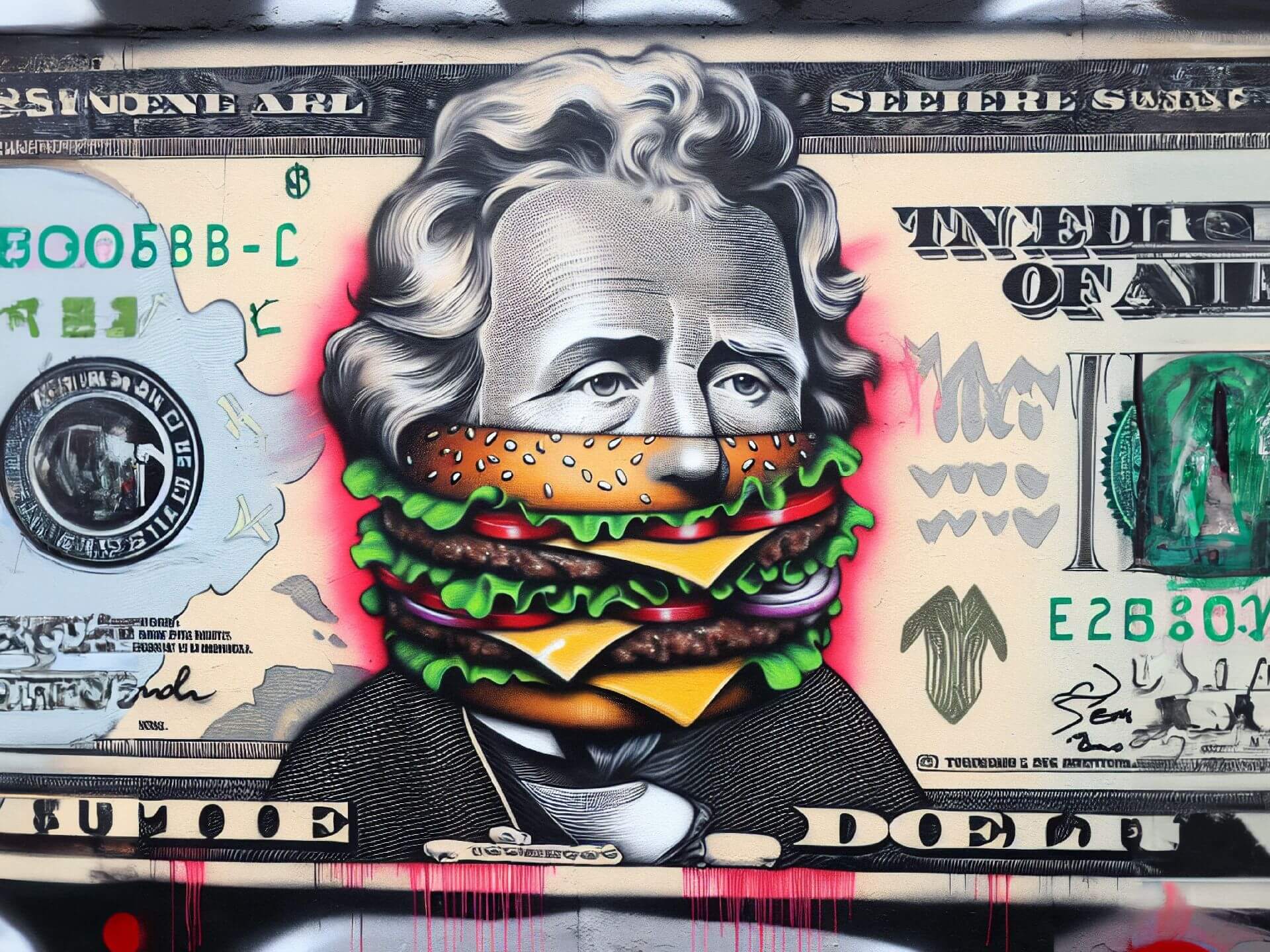Rocky Start to California’s Fast-food Wage Hike
by David Klemt

I instructed AI to draw a cheeseburger on a $20 bill, in street art style. Enjoy.
We’re barely two weeks into the $20-per-hour wage hike for fast-food workers in California and not everyone is happy with the results thus far.
That is, of course, if reports are accurate. However, the stories coming out of the Golden State are raising eyebrows.
On April 1, the minimum wage for fast-food workers in California jumped to $20 per hour. On the surface, AB 1228 appears to be a victory for hourly hospitality professionals employed by fast-food concepts.
Unfortunately, once we go beyond the surface, things aren’t that cut and dry.
Operators in California are implementing all manner of adaptations in response to the state’s minimum wage boost:
- Increasing menu prices.
- Cutting staff hours.
- Reducing staff.
- Decreasing operating hours.
- Closing one or more days of the week.
- Postponing updates and upgrades.
- Focusing on delivery.
- Introducing automation.
- Putting items that require less labor on the menu.
- Closing locations permanently.
It should go without saying but a wage increase doesn’t do much good if one’s hours are reduced significantly. Further, it does zero good if one’s employer shutters the workplace.
Per reporting, that’s precisely the situation team at one Fosters Freeze location is in currently. On April 1, workers at a Lemoore, California, location received a group text explaining that their restaurant was closing permanently. Understandably, some staff thought the text was an April Fool’s Day prank.
Certainly, the Lemoore Fosters Freeze isn’t the only restaurant closure related directly to the minimum-wage hike. Nor, it seems, will it be the last.
More Pain Points
When people hear about fast-food menu price increases, the assumption is that guests will reduce visits. Or, perhaps they’ll adjust their usual order. Alternately, some people anticipate guests will give their business to a different fast-food brand.
However, there’s another result that some fast-food operators in California are anticipating or experiencing already.
At a certain point, perception of value is affected negatively. Eventually, a consumer will perceive more value in visiting a full-service restaurant than a QSR or LSR. So, it’s likely that fast-food operators in California will lose guests to traditional “sit-down” concepts.
Should that possibility become a reality, traffic will drop. When the traffic drops, workers’ hours are reduced. Some operators, therefore, will lose staff to FSRs; people need to go where the work and money are, after all.
So, beyond the need to adapt to comply with the new minimum-wage law, fast-food operators must compete with FSRs to keep staff and guests.
What’s a Fast Food Restaurant?
Curious about how California defines “fast food restaurant” in AB 1228, I looked up the text of the bill.
The relevant parts are found under section 1474:
“(a) ‘National fast food chain’ means a set of limited-service restaurants consisting of more than 60 establishments nationally that share a common brand, or that are characterized by standardized options for decor, marketing, packaging, products, and services, and which are primarily engaged in providing food and beverages for immediate consumption on or off premises where patrons generally order or select items and pay before consuming, with limited or no table service. For purposes of the definitions in this part, ‘limited-service restaurant’ includes, but is not limited to, an establishment with the North American Industry Classification System Code 722513.”
1474 also includes the following:
“(c) (1) Except as provided in paragraph (2), ‘fast food restaurant’ means a limited-service restaurant in the state that is part of a national fast food chain.”
Interestingly, there’s also this exemption:
“(2) ‘Fast food restaurant’ shall not include an establishment that on September 15, 2023, operates a bakery that produces for sale on the establishment’s premises bread, as defined under Part 136 of Subchapter B of Chapter I of Title 21 of the Code of Federal Regulations, so long as it continues to operate such a bakery. This exemption applies only where the establishment produces for sale bread as a stand-alone menu item, and does not apply if the bread is available for sale solely as part of another menu item.”
Further, AB 610 carves out more exemptions.
Accusations of Corruption
The bakery exemption is fueling accusations of corruption.
Per reports, the exemption is quite favorable for Panera Bread. Why is that particular chain being held up as an example of special treatment and corruption?
As it turns out, should reporting prove accurate, a Panera Bread franchisee and billionaire named Greg Flynn is a Governor Gavin Newsom campaign donor. It’s claimed that Flynn has donated more than $200,000 to Gov. Newsom.
Last month, Flynn, in response to what has been dubbed “PaneraGate,” stated that the minimum wage at his franchise locations would rise to $20 per hour. This announcement was, Flynn claimed, to remain competitive, and in no way a reaction to the controversy surrounding what many perceived to be a favorable exemption for a donor, high school friend, and past business partner.
Again, California is barely two weeks in to this mandated pay rise. To say it’s early days is an understatement. There will be further consequences and adaptations for months and years to come.
So far, however, while many workers and even business owners are happy with the new law, some are already sounding alarms and pushing back.
Image: Shutterstock. Disclaimer: This image was generated by an Artificial Intelligence (AI) system.


